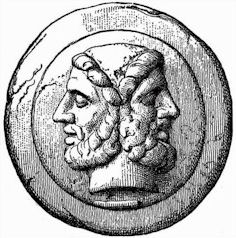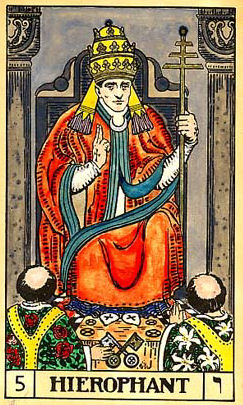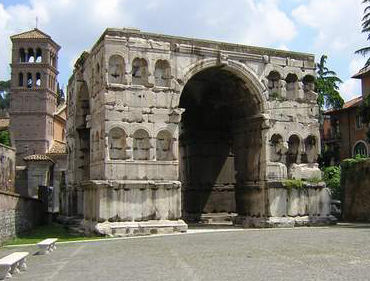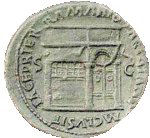|

Janus, Custodian of the Cosmos
— Brenda Sutton

Who doesn't remember their elementary school janitor as a mysterious person of power? The man saw everything.
He was always there when someone thought they could sneak in or out of the building. He guarded and often guided the errant and
helpless. The janitor. His title comes from the Roman god Janus, (pronounced "YAH-noos") who remains the custodian of the
cosmos, watching over and caring for the world.
Janus maintains a place of slight remembrance on our calendars — Januarius (pertaining to Janus) —
but his occupation at the start of the year is no accident. New Year's Day is sacred to Him. Pater Matutinus1
— father of the morning, son of light — came before Jupiter and all of the other Roman gods that
the modern world so readily remembers. Janus is the God of Gods.
Also called Janus Patulcius, the opener, and Janus Clusius, the closer, his images are painted and engraved on thresholds,
gates, doors and arches. They are His natural realm, as a ruler of Time/Space/Mind. Standing under the lintel, He commands
the present, with the past and future spread out behind and before Him. Janus' two faces (or very often, two separate heads)
sometimes show a clean-shaven youth gazing naively toward the future, and a somber bearded sage reflecting on the wisdom of the past.
Nothing hides from the far-sighted vision of Janus. He minds journeys, beginnings and endings, and success. A god of prophecy, he
reconciles opposites. His white thorn rod, placed in a window, keeps evil away2.
Janus came to Rome from the ancient Italic Sabine tribes who inhabited the areas of Lazio, Umbria, and Abruzzi in Northern Italy.
The godform of Janus remained wholly Roman, with no Greek counterpart. He evolved from Dianus, an oak god. One of his wives, Jana,
is a version of Diana (Dione), the moon and woodland goddess. His parents were Aurora, bringer of light, and Orion, the mighty hunter
and fire-setter. Interestingly enough, Janus is also associated with Lucifer, another fire and light diety.

Janus guarded the entryways to every Roman home, and the gates of every Roman city. The
blessings of Janus
where implored before every business venture, marriage, war, coronation... pretty much before every activitiy of Roman life.
His two faces were stamped on every Roman coin. He is called Matutinus (morning), as He greets every rising sun.

Modern playing cards still hold his image in the two-faced jack. His tarot aspects are seen in potential beginnings and endings of deuces,
far-sighted kings and venturing knights. One of Janus' important symbols is also embedded in the Hierophant card dressed as a pontiff,
whose outfit derives from "the pomp of the Babylonian costume, as Belshazzar himself might have done, in robes of scarlet, with
the crosier of Nimrod in his hand, wearing the mitre of Dagon and bearing the keys of Janus [time/space] and Cybele [growth/regeneration]."
3 The protector of trade and shipping, Janus is often depicted with His set of keys in one hand, and a staff or sheaf of corn
in the other. His image was engraved not only over the lintels of doors, but on docks and the prows of ships, to protect sailors and merchants
in their comings and goings.
During the reign of Domitian (Titus Flavius Domitianus — 75 - 86 a.d.), Janus acquired two more heads, and became known as
Janus Quadrifons (four-sided). Not only in charge of minding the past, present and future, He was now put in charge of the seasons
of the year, holding the number 300 in one hand, and 65 in the other. It might be His way of saying that Life isn't even-handed.

Janus' place of worship began as an archway through which the Roman army marched to and returned from war. His temple stood
on the Janiculum (the Hill of Janus), one of Rome's seven foundational hills. Each side of this temple contains one doorway and
twelve windows representing the four seasons and the months in that season. Inside were twelve altars, one for each month. In times of
war the temple gates were kept open to allow easy access for offerings to the god. In times of peace, the gates were closed. Not
surprisingly,this only happened a handful of times in warrior Rome's seven hundred years.

Janus Quirinus, which our ancestors ordered to be closed whenever there was peace, secured by victory, throughout the
whole domain of the Roman people on land and sea, and which, before my birth is recorded to have been closed but twice in all since
the foundation of the city, the senate ordered to be closed thrice while I was princeps.
—Augustus Res Gestae 13
Though images of Janus are plentiful, there aren't many stories. One, according to Ovid4, involves his accidental
meeting of the flirtatious nymph Cardea. She was a saucy one, who delighted in tempting a suitor to enter a cave before her with the promise of
favours. He would ready himself for a hot time, and then Cardea simply skipped off. Such a tease! She tried the same trick on Janus, but forgot that
two heads are better than one. Janus had eyes in the back of his head. Being a god of prophecy, He knew Cardea's plan and caught
the nymph before she could flee. Janus rewarded Cardea with the power to scare off the strigæ and lamii, the nocturnal vampires.
He also endowed Cardea (whose name means "she of the Hinge") with His own protective power "to open what is shut and shut what is open",
— a generous lover, Janus.
As we enter each new year, think on Janus with a Roman prayer:
Matutine pater, seu Jane, libentius audis, unde homines operum primos vitaeque labores instituunt, sic dis placitum, tu caminis
esto principium.
— Satires II 6.20-3 by Q. Horatius Flaccus
Translation from Moravius Piscinus: Father Matutinus, or else Janus, if You would prefer to hear, regarded by men as the beginning
of works and life's labors, so does it please the Gods, may You begin my song.
- (HORACE, Sat. ii. 6, 20, p. 674)
- MARCUS SULLA, Secespita (The Sacrificial Knife), A Roman Book of Blood Sacrifice
- (HISSOP, The Two Babylons, Sec. I, The Red Dragon, para 30 and notes)
- (OVID, (Fast. vi. 101, seq.)
 Brenda Sutton is an award-winning singer/songwriter with the internationally reknown band Three Weird Sisters. She works in a support and consultant capacity for the non-profit music organization Interfilk, and maintains their website. She is freelance writer whose work has appeared in newspapers and magazines. She is also the mother of five, grandmother of two. Brenda is the Corporate Secretary for the Mythic Imagination Institute Board of Directors, and she ran the Institute's main office from 2002 —' 2007, helping to organize the Mythic Journeys conferences, and adding content to the Mythic Imagination Institute's website. In 2007 she moved into the Victorian Queen Anne home of her dreams in Danville, Indiana where she continues to work for M.I.I. remotely, spending her "free" time writing, composing, traveling, gardening, helping to run other conferences ... and publishing Mythic Passages. Brenda Sutton is an award-winning singer/songwriter with the internationally reknown band Three Weird Sisters. She works in a support and consultant capacity for the non-profit music organization Interfilk, and maintains their website. She is freelance writer whose work has appeared in newspapers and magazines. She is also the mother of five, grandmother of two. Brenda is the Corporate Secretary for the Mythic Imagination Institute Board of Directors, and she ran the Institute's main office from 2002 —' 2007, helping to organize the Mythic Journeys conferences, and adding content to the Mythic Imagination Institute's website. In 2007 she moved into the Victorian Queen Anne home of her dreams in Danville, Indiana where she continues to work for M.I.I. remotely, spending her "free" time writing, composing, traveling, gardening, helping to run other conferences ... and publishing Mythic Passages.
Return to Passages Menu
Subscribe to the Passages e-newsletter
|

